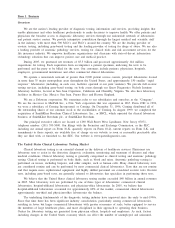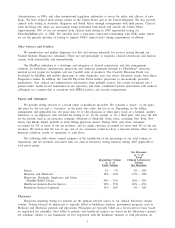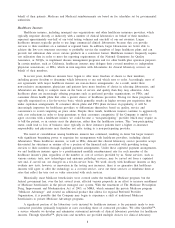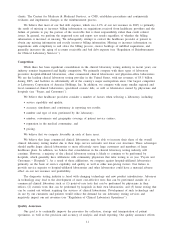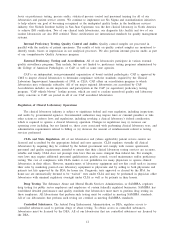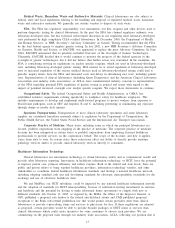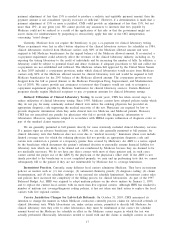Quest Diagnostics 2005 Annual Report Download - page 25
Download and view the complete annual report
Please find page 25 of the 2005 Quest Diagnostics annual report below. You can navigate through the pages in the report by either clicking on the pages listed below, or by using the keyword search tool below to find specific information within the annual report.behalf of their patients. Medicare and Medicaid reimbursements are based on fee schedules set by governmental
authorities.
Healthcare Insurers
Healthcare insurers, including managed care organizations and other healthcare insurance providers, which
typically negotiate directly or indirectly with a number of clinical laboratories on behalf of their members,
represent approximately one-half of our total testing volumes and one-half of our net revenues. Larger
healthcare insurers typically prefer to use large commercial clinical laboratories because they can provide
services to their members on a national or regional basis. In addition, larger laboratories are better able to
achieve the low-cost structures necessary to profitably service the members of large healthcare plans and can
provide test utilization data across various products in a consistent format. Healthcare insurers frequently require
test utilization data in order to meet the reporting requirements of the National Committee for Quality
Assurance, or NCQA, to implement disease management programs and for other health plan operation purposes.
In certain markets, such as California, healthcare insurers may delegate their covered members to independent
physician associations, or IPAs, which in turn negotiate with laboratories for clinical laboratory services on
behalf of their members.
In recent years, healthcare insurers have begun to offer more freedom of choice to their members,
including greater freedom to determine which laboratory to use and which tests to order. Accordingly, most of
our agreements with major healthcare insurers are non-exclusive arrangements. As a result, under these
non-exclusive arrangements, physicians and patients have more freedom of choice in selecting laboratories, and
laboratories are likely to compete more on the basis of service and quality than they may otherwise. Also,
healthcare plans are increasingly offering programs such as preferred provider organizations, or PPOs, and
consumer driven health plans that offer a greater choice of healthcare providers. Pricing for these programs is
typically negotiated on a fee-for-service basis, which generally results in higher revenue per requisition than
under capitation arrangements. If consumer driven plans and PPO plans increase in popularity, it will be
increasingly important for healthcare providers to differentiate themselves based on quality, service and
convenience to avoid competing on price alone. Despite these trends, healthcare insurers continue to aggressively
seek cost reductions in order to keep premiums to their customers competitive. If the Company is unable to
agree on terms with a healthcare insurer, we could become a “non-participating’’ provider which may require us
to bill the patient, or in certain cases the physician, rather than the healthcare insurer. This “non-participating’’
status could lead to loss of business since typically in these instances patients have a higher co-insurance
responsibility and physicians may therefore not refer testing to a non-participating provider.
The trend of consolidation among healthcare insurers has continued, resulting in fewer but larger insurers
with significant bargaining power to negotiate fee arrangements with healthcare providers, including clinical
laboratories. These healthcare insurers, as well as IPAs, demand that clinical laboratory service providers accept
discounted fee structures or assume all or a portion of the financial risk associated with providing testing
services to their members through capitated payment arrangements. Under these capitated payment arrangements,
we and healthcare insurers agree to a predetermined monthly reimbursement rate for each member of the
healthcare insurer’s plan, regardless of the number or cost of services provided by us. Some services, such as
various esoteric tests, new technologies and anatomic pathology services, may be carved out from a capitated
rate and, if carved out, are charged on a fee-for-service basis. We work closely with healthcare insurers as they
evaluate new tests; however, as innovation in the testing area increases, there is no guarantee that healthcare
insurers will agree to offer the technology as a covered service, carve out these services or reimburse them at
rates that reflect the true cost or value associated with such services.
Historically, most Medicare beneficiaries were covered under the traditional Medicare program, but the
federal government has, over the last several years, effected various proposals in an effort to increase enrollment
of Medicare beneficiaries in the private managed care system. With the enactment of The Medicare Prescription
Drug, Improvement and Modernization Act of 2003, or MMA, which renamed the private Medicare program
“Medicare Advantage’’ and created an additional product that allows for regional Preferred Provider
Organization, it is possible that the Company may begin to experience a shift of traditional Medicare
beneficiaries to private Medicare Advantage programs.
A significant portion of the laboratory costs incurred by healthcare insurers is for payments made to non-
contracted providers (primarily hospitals) at rates exceeding those of contracted providers. We offer QuestNetTM,
a service whereby we develop and administer customized networks of clinical laboratory providers for healthcare
insurers. Through QuestNetTM, physicians and members are provided multiple choices for clinical laboratory
8





